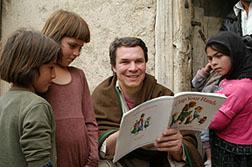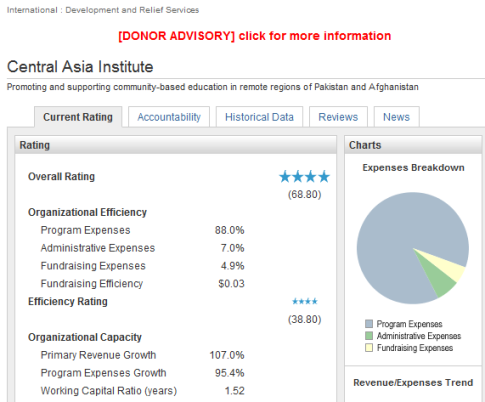
This is a sad story
This was a story of hope and real impact, but now it's nothing but a tornado of accusations, doubt, controversy, and anger.
Greg Mortenson spoke at Virginia Tech two years ago and I was lucky enough to get a 2nd row seat. He delivered a genuinely touching speech describing how the US military presence in Afghanistan (and Pakistan) set such negative impressions in the region, and how his organization delivered on an opportunity to rewrite those impressions.
Greg Mortenson and the Central Asia Institute
Greg described how he and his nonprofit organization, Central Asia Institute, ignored the obvious dangers of a war zone and went on to show Afghani's and surrounding tribes that the US is not all about bullets and bombs. He instead showed that Western countries really want these countries and their citizens to be able to read and succeed in the long term.
By educating Afghani and Pakistani youth, families were able to read the Koran for themselves and realize that the passages Taliban and Al Qaida leadership had been quoting was not accurately represented. Most essentially, relating to the idea of Jihad and how that part of their scripture had been misrepresented to radicalize young men against "the West".
Greg's amazing story, Three Cups of Tea, includes this picture:

The Central Asia Institute utilized a similar approach to that of the Grameen bank- that by teaching young women (not men) critical life skills such as reading and arithmetic- the mothers are more likely to educate, provide adequate food, and teach healthy lifestyles to their own children. Because of this "radical" approach of educating Islamic women, Greg says the Taliban and Al Qaida fighters targeted and burned down many of schools he helped build.
But, by showing the compassion of the US directly juxtaposed with Al Qaida burning schools, he was able to begin winning their hearts and minds- and the towns rebuilt their schools and stopped sending their young men to fight with Al Qaida.
That was the essence of his speech and best-selling book. As for the current debacle involving accusations of mismanagement, even a fabricated story, which is swirling in the media...
A storm brewing
It is understandable and almost expected. In his book, he talked about frequently surviving paycheck-to-paycheck and living from his car for what seemed to be most of his twenties. He portrays himself as a free spirit pursuing his dreams.
Recounting his life story does not build any credibility as someone with a business or financial management background, instead the stories portray Greg as someone who saw an amazing opportunity and followed through the best he knew how.
Take his background, add $20 million dollars of donations, and then say "Go spend it helping build schools in a frontier war zone". A war zone where brides, back scratching, etc are the only to get things done – and it's a recipe for disaster – almost exactly as reported.
To quote a family friend who also coordinated logistical operations in a warzone (and who's former employer is now facing massive fraud lawsuits as I type)...
"In a war zone, there are no ATM's, no banks to deposit a check at, no receipts, no internet for email or accounting software, and people really are getting blown up. Audits work great in the US, where we have an extremely steady business environment and a culture that expects honesty- However, working in these "frontier" type areas is a completely different game. Local warlords control the highways and there is no passage without their graces (which always requires some sort of payment/bride). Credit cards don't work. Cash and barter are the only options. Even having a receipt can be a liability if captured and interrogated by a hostile group..."
So as I said in the first line, reading those two news articles is saddening. There may be an exaggeration of his impact, but I find it hard to believe his story is completely fabricated. I believe that Greg genuinely cares.
However, given his lack of a business and/or legal background, I can see how he jumped through hoops to make good things happen. Getting to ends without thinking about the means, only to wreck his reputation by working in an environment that is inherently non-compliant to any modern society's standard.
What can we do differently?
So then the question for us – as supporters of mission driven organizations - is how can an organization remain compliant to donor expectations while working to help those who live in warzones, lawless regions, and cash and barter based cultures? How can an organization protect it's reputation while working for those kids who break the cycle of poverty and hatred that has been so ripe for terrorist groups to recruit from.
Increased scrutiny showing on sites like Charity Navigator:

In these frontier environments, there are always going to be fuzzy audit trails. There are also going to be seriously skewed expense reports ($9,000 flight from the US to Afghanistan, to build a school that only costs $500 in local materials and labor). Further, Greg needed those pictures of him on site in Pakistan to prove his credibility with western philanthropists and raise funds for future schools.
Additionally, it's just a fact that US based fundraising is so much more expensive than building schools in remote villages. Because of these pricing differences, Greg's overhead to program expenses ratio will be absurdly low in comparison to purely US based groups.
So how does a nonprofit charity like Greg's talk about these strategic realities without getting publically roasted by the media?
"Quotables"
Well, maybe we should repost a few quotes from a man based in Pakistan.
This is a quote posted in the the Wall Street Journal's comment section:
"We the natives of Gilgit-Baltistan, a region of former princely state of Jammu and Kashmir do have lot of respect for him for providing education to girls in that area. The region has one of the lowest per capita incomes and one of the lowest literacy rates and without support of NGOs like CAI and AKDN, education would be a dream for the majority as more than half of the locals live below the poverty line. Since Pakistan government has failed to provide for the educational needs of the people of Gilgit-Baltistan, it is people like Mortenson who became the hope for us - senge sering"
Another article posted here summarizes Greg's impact in the war zone:
"Imagine if the money had been given to the Afghan government or contractors - it would not have been built!" the worker, who wished to remain unnamed, said."
Moving Forward
A majority of the articles covering this story have predicted major shifts in accountability and new reporting demands. While I am a firm believer that the END GOAL should never become secondary to red tape and bureaucracy, there is going to be an increased level of awareness and reporting.
Organizations will need to refocus on their strategic plans, engage risk management and compliance officers, and clearly communicating their Balanced Scorecard with supporting donors and philanthropists. We just hope this additional scrutiny does not stop the amazing stories of success which preceded this media firestorm.



June 2021
| S | M | T | W | T | F | S |
|---|---|---|---|---|---|---|
| 1 | 2 | 3 | 4 | 5 | ||
| 6 | 7 | 8 | 9 | 10 | 11 | 12 |
| 13 | 14 | 15 | 16 | 17 | 18 | 19 |
| 20 | 21 | 22 | 23 | 24 | 25 | 26 |
| 27 | 28 | 29 | 30 |
Monthly Archive
June 2014 (1)
May 2014 (2)
March 2014 (1)
February 2014 (2)
January 2014 (1)
December 2013 (1)
October 2013 (2)
September 2013 (1)
July 2013 (2)
June 2013 (2)
April 2013 (1)
March 2013 (3)
February 2013 (4)
January 2013 (7)
December 2012 (4)
November 2012 (8)
October 2012 (9)
September 2012 (5)
August 2012 (6)
July 2012 (5)
June 2012 (7)
May 2012 (8)
April 2012 (5)
March 2012 (5)
February 2012 (6)
January 2012 (6)
December 2011 (7)
November 2011 (9)
October 2011 (9)
September 2011 (2)
August 2011 (8)
July 2011 (6)
June 2011 (8)
May 2011 (12)
April 2011 (5)
March 2011 (1)
February 2011 (2)
January 2011 (4)
December 2010 (6)
November 2010 (3)
October 2010 (5)
September 2010 (4)
August 2010 (3)
July 2010 (2)
June 2010 (1)
May 2010 (2)
April 2010 (1)
March 2010 (3)
January 2010 (4)
December 2009 (1)
November 2009 (1)
October 2009 (1)
September 2009 (3)
August 2009 (2)
July 2009 (3)
June 2009 (3)
May 2009 (6)
April 2009 (5)
March 2009 (3)
February 2009 (2)
January 2009 (2)
December 2008 (2)
November 2008 (2)
October 2008 (4)
September 2008 (6)
August 2008 (5)
July 2008 (4)
June 2008 (9)
May 2008 (5)
April 2008 (6)
March 2008 (8)

